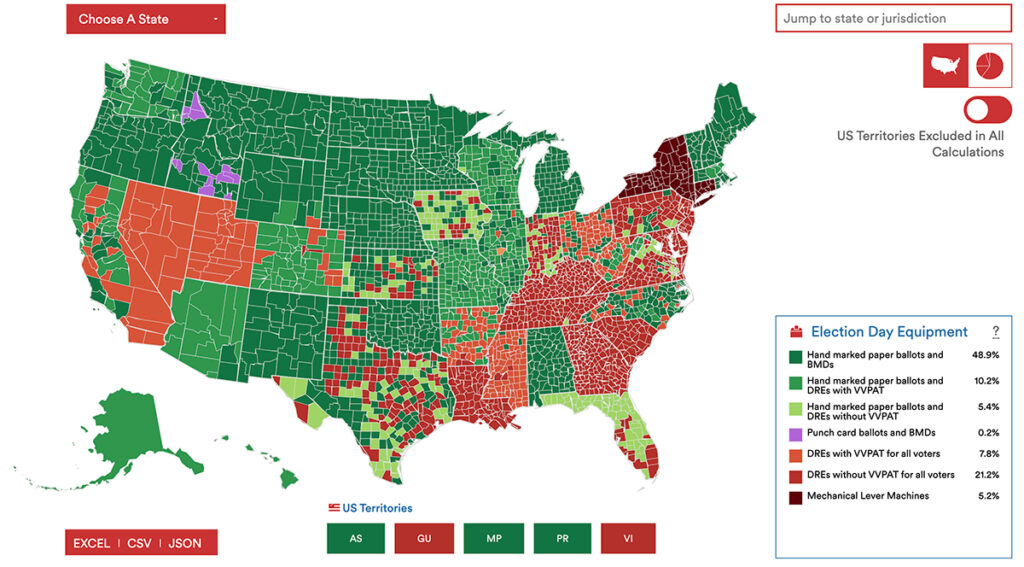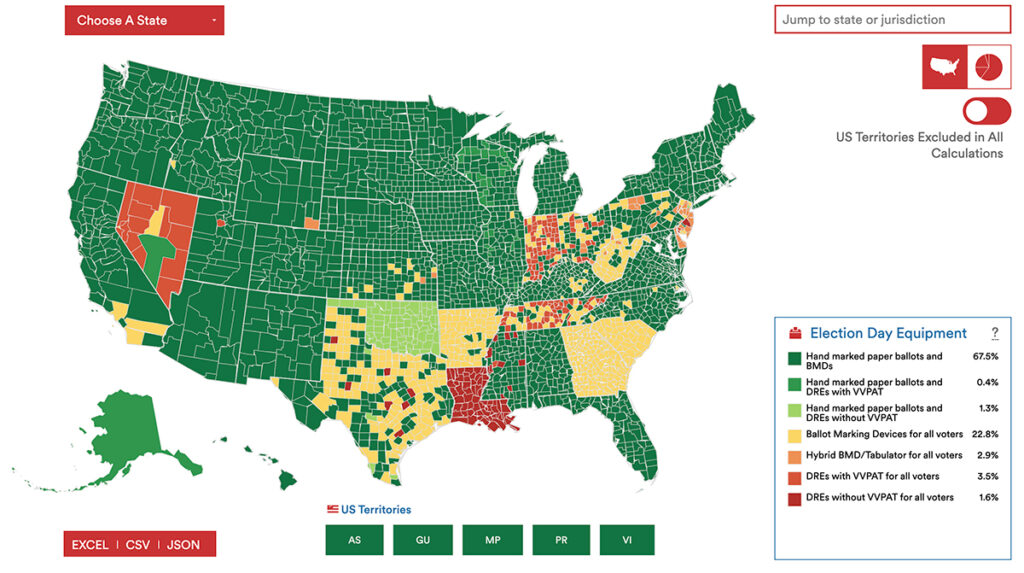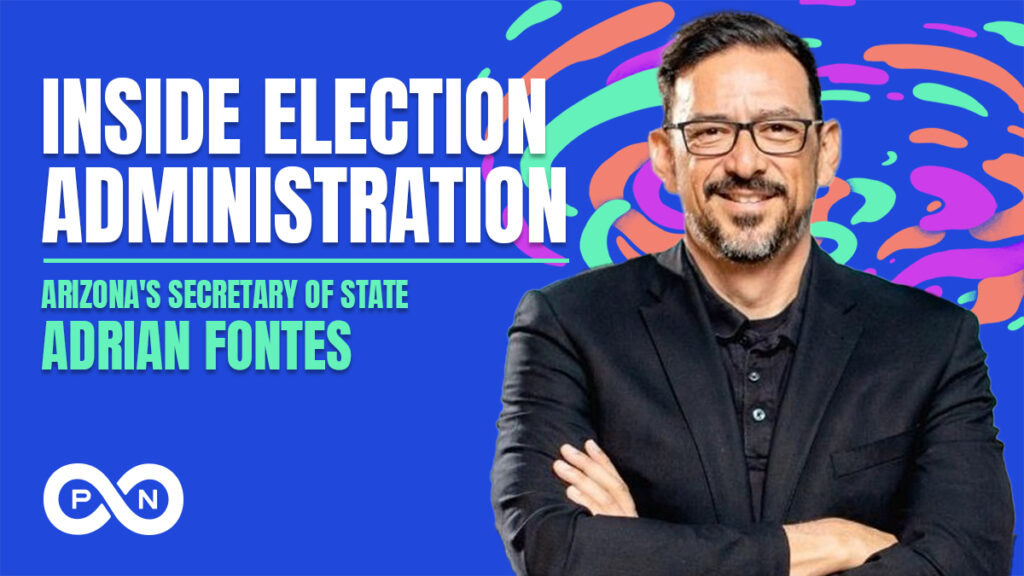Volcanoes are erupting in The Philippines, but on-fire Australia received some welcome rain. The Iran war cries have been called off and The Donald’s military powers are about to be hamstrung by the Senate. Meanwhile, his impeachment trial is starting, and we’re all on Twitter for a front-row seat.
What Could Go Right? How US Elections Work
US elections have become more secure over time, not less.
This is our weekly newsletter, What Could Go Right? Sign up here to receive it in your inbox every Thursday at 5am ET. You can read past issues here.
How US Elections Work
The 2024 presidential election is looming. This week I heard from a reader struggling to wade through the marsh of disinformation and election denialism surrounding the 2020 election. She asked: “How do I know that the machine I feed my ballot into is legit? What checks and balances are in place to make sure someone isn’t hacking these devices?”
There has never been a “rigged” American presidential election. Still, in order to trust the system, voters should understand both how it works and how it has become more secure over the past couple of decades. A solid base of knowledge is the best hedge against doubts, misunderstandings, or bad-faith assertions.
The move against paper
Let’s cast our memories back to the 2000 presidential election, when a manual recount of votes in a handful of Florida counties resulted in a nationwide debate over “hanging chads”—small pieces of paper left over from when a punch-card voting machine didn’t punch all the way through a voter’s selection.
Freaked out by the debacle and with the passage of the Help America Vote Act in 2002, which mandated that states upgrade their voting systems and gave them billions to follow through, many states moved away from paper and toward electronic voting methods. Punch-card voting started to be phased out.
By 2006, states were using a mix of the following:
- Paper ballots filled out by hand, which are then machine-scanned (electronic tabulation is more accurate than hand-counting—only a very small number of jurisdictions in the US count by hand). This is the method most widely used today, as it is considered the most secure by both the federal government and independent experts.
- Direct recording electronic (DRE) systems, an electronic voting machine that records votes directly into its computer memory. Some DREs have Voter Verified Paper Audit Trail (VVPAT) printers, which allow a voter to confirm their selections on a paper record, which is saved. Other DREs do not have the option to print a paper record.
- Ballot marking devices (BMDs), electronic voting machines that print a record of a voter’s choices, which the voter then verifies. BMDs were originally developed for voters with disabilities, as they have visual, hearing, and tactile aid tools, but a handful of states use them for all voters.
We can see which states were using what in this map from the nonpartisan organization Verified Voting, an election security group founded in 2004 by a Stanford University computer scientist. In 2006, roughly 20 percent of voting jurisdictions used DREs with no printed record. And New York was still using mechanical lever machines!

Soon, however, cybersecurity experts raised concerns that DRE machines were especially vulnerable to hacking or software malfunctioning, because the results are saved directly in the computer’s memory. In the cases of DREs without any printed record, there was no way to verify, in the event of an audit or recount, that the votes that were recorded were the same as the votes that were cast.
Paper’s comeback
This obvious drawback, particularly after the 2016 election concerns over Russian interference, is why government officials and independent experts began recommending that all states use voter-verified paper ballots, because they are marked by hand, not a machine, before they are tabulated. They can also be easily audited or recounted. Hacking from foreign adversaries, software corruption, an untrustworthy election official—the idea is that any claim can be addressed by checking against the paper record.
For the 2024 presidential election, nearly every American voter will be casting their votes on paper or on a machine with a paper trail.

Louisiana, the only state to still exclusively use DREs without a paper trail, is in the midst of writing new standards for their voting system after a 2022 government commission recommended moving to hand-marked paper ballots or BMDs, and scanned tabulation. It’s unlikely the system will be upgraded before the 2024 election, however.
Security measures and post-election audits
There are federal, state, and county regulations for conducting elections in the US. The US Election Assistance Commission publishes a general guide to the security measures election officials follow in each county before and during the election, including technical testing of the equipment—which the public can attend—to catch any software anomalies or evidence of foul play, maintaining a strict chain of custody for paper ballots, and verifying that the total number of voted ballots matches the total number of voters.
Post-election, all states go through a process called canvassing, by which every state validates the results of an election by county and then state level. This is the step done before the results are certified.
One part of the canvassing process—and an important way to check that everything has worked as it should—is the post-election audit. An audit takes a random sample of paper ballots or records and checks them against the voting system results. Today, only a few states don’t require automatic audits, although some states without them, like Maine, will pilot audits in coming years.
In the event of a race that is too close to call or contested results, a recount can also be performed, by machine or by hand. Per the US Election Assistance Commission, many US states have recount manuals that they follow in these cases.
Further resources
Long story short, there is a robust, extensive system in place to ensure that the American public can place their trust in election outcomes. There are issues, among them irregular federal funding, outdated machines, and the possibility of cyberattacks. But if something erroneous is noticed, the system is designed so that election officials can figure out what happened and correct it.
To be extra sure, you can even look up your voting jurisdiction on Verified Voting’s website and learn about what equipment is used there, down to the make and model. Or you can learn about your state’s election and auditing procedures.
To address claims made by former president Donald Trump after the 2020 election, at this point the Cybersecurity & Infrastructure Security Agency (CISA), which is part of Homeland Security, as well as the FBI, CIA, and NSA have all weighed in to confirm that the election was not compromised. Recounts in certain Wisconsin, Arizona, and Texas counties, as well as statewide in Georgia, and regular audits in 43 states, including all of the battleground states, backed up the outcome.
The Progress Network Member Isaac Saul wrote a long piece debunking claims made about ballot-box stuffing in the film 2,000 Mules. The CISA addresses other common disinformation claims, including information on how election officials test for software anomalies in voting machines, here. And The New York Times fact-checks various theories promoted by Trump here ($).
On the podcast this week, we spoke to a man in the thick of it all, Adrian Fontes, Arizona’s Secretary of State, who oversees elections there. He told us about what the state is doing to prepare for 2024, what surprisingly bipartisan laws have been passed to recover from the state’s loss of election officials who were harassed out of their posts, and why he remains optimistic about a smooth election. Listen now.
What Could Go Right? S5 E17

How are states like Arizona preparing for the 2024 presidential election in the United States? How do they ensure the public our votes are safe? And why can’t we track our mail-in votes like Uber Eats? Today, we talk with Adrian Fontes, the Secretary of State of Arizona, to discuss the functioning and importance of the electoral process in the United States, with a particular focus on the state of Arizona. | Listen now
‘Libraries Are That Safe Place for Discussion of Ideas’

Librarian Carla Hayden, the first woman and the first African American to lead the Library of Congress, discusses the dynamic and essential role libraries play in American life. | Read more
By the Numbers
+1,000: The number of electric vehicle charging stations the US has installed since last summer. (Bloomberg $)
$.12: The cost per watt of a solar module in 2023, a 50 percent drop from 2022 and an 89 percent drop from 2012, when it was over $1.00. (This is from an annual collection of decarbonization charts by Nate Bullard.)
300: The capacity, in megawatts, of floating solar that Southeast Asia will add in early 2024.
Quick Hits
🇮🇳 India is on the verge of eliminating “black fever.” Spread by sandflies, it is the second deadliest parasitic disease after malaria. Bangladesh eliminated it last year.
🧑⚕️ English patients with simple maladies like sore throats and UTIs can now skip going to the doctor and be treated directly by pharmacists, freeing up much-needed GP appointments.
🚗 The overall numbers of electric vehicle uptake in Greece are low, but they are multiplying quickly, putting the nation in an “electric car moment.” It’s not just in Greece—reports say that the world hit peak gas powered vehicle sales in 2017. (Bloomberg $)
🌲 Temperate and polar forests are in slow recovery, with many nations increasing their forest coverage. Laid next to the loss of tropical forest, on net forests may no longer be contributing to climate change. (Bloomberg $)
🌝 Japan became the fifth country to land a spacecraft on the Moon last month. Landing 55 meters from its target, it was the most precise landing in history, but the craft was stuck without power for a week afterward. Having now soaked in enough solar power to start using its camera, the lander is now searching the lunar surface for a mineral that may hold clues to the Moon’s origin.
💉 Everything you need to know about self-amplifying RNA vaccines (saRNA), the next generation of mRNA vaccines that may mean we can dose at smaller amounts and be straddled with smaller reactions.
🔬 Nice News has a compilation of the most recent cancer breakthroughs, from new screening tests to a treatment for pediatric brain cancer to personalized cancer vaccines.
🔊 What could one day replace millions of batteries? Sound-sensitive sensors, which react to sound waves and require zero energy, are being developed by Swiss researchers and could be used to monitor bridges or buildings, and medical devices. The plan is to have a prototype by 2027.
💄 New Zealand will ban PFAs “forever chemicals” in cosmetics by 2026, likely the first country to do so. They are banned in a couple of US states, and the European Union is also looking to ban them in cosmetics by 2030.
🤑 It’s not just the US heading for an economic soft landing, but the entire world, according to the International Monetary Fund’s just released World Economic Outlook.
👰 It will no longer be mandated in Turkey that women take their husband’s last names after marriage.
🍄 The field of addiction medicine is adjusting to younger generations’ disinterest in alcohol, and the potentially healing properties of cannabis, ketamine, and psychedelics. (NYT $)
👀 What we’re watching: A bill in France that would enshrine the right to an abortion in the country’s Constitution has been approved by the National Assembly, the first step needed for passage. There is no guarantee that the law will pass, but there is no serious resistance.
💡 Editor’s pick: The Washington Post just launched a new column called Why Not?. Each week, columnist Daniel Pink will offer a single idea for “improving our country, our organizations or our lives.” He calls it “possibility journalism.” All right, Mr. Pink, we’re listening! ($)
TPN Member Originals
(Who are our Members? Get to know them.)
- The zeitgeist of doom | The Atlantic ($) | David Brooks
- What it will take to make clean energy affordable—for everyone | WaPo ($) | Bina Venkataraman
- The two crises in the news business | Slow Boring | Matthew Yglesias
- The lives of two Navy SEALs remind us how to live like heroes | WaPo ($) | Theodore R. Johnson
- Good news on the economy? | Tangle | Isaac Saul
- A Biden Doctrine for the Middle East is forming. And it’s big. | NYT ($) | Thomas L. Friedman
- Don’t be a borrower if you can help it | The Atlantic ($) | Arthur C. Brooks
- ‘This could be the best decade in history—or the worst’ | FT ($) | Erik Brynjolfsson
- How Oregon became a linchpin for the country’s drug policies | NYT ($) | Maia Szalavitz


